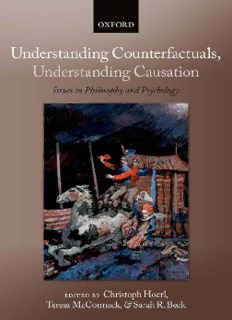
Understanding Counterfactuals, Understanding Causation: Issues in Philosophy and Psychology (Consciousness Ans Self-Consciousness) PDF
Preview Understanding Counterfactuals, Understanding Causation: Issues in Philosophy and Psychology (Consciousness Ans Self-Consciousness)
Understanding Counterfactuals, Understanding Causation ConsciousnessandSelf-Consciousness This series arises from the activities of the Consciousness and Self-Consciousness Research Centre at Warwick University. The present volume is one of three interdisciplinary volumes growingoutofanAHRCProjecthostedbytheCentre between2004and2008,on‘Causal Understanding: Empirical and Theoretical Foundations for a New Approach’. Much of the thought behind the project on causal understanding was informed by the idea that making progress on questions regarding consciousness and self-consciousness requires, amongst other things, getting clearer about the extent to which causal understanding is implicated in our awareness of and interaction with our environment, as well as in our grasp of our own place init.Thisinturn,however,alsorequiresgettingcleareraboutwhatexactlycausalunderstanding consists in, and what its distinctive features are. The three volumes explore these issues by integrating philosophical work with experimental and theoretical work in developmental psychology,cognitivepsychology,andneuropsychology. Alsopublishedintheseries: TimeandMemory,editedbyChristophHoerlandTeresaMcCormack AgencyandSelf-Awareness,editedbyJohannesRoesslerandNaomiEilan JointAttention:CommunicationandOtherMinds,editedbyNaomiEilan,ChristophHoerl,Teresa McCormack,andJohannesRoessler Perception,Causation,andObjectivity,editedbyJohannesRoessler,HemdatLerman,andNaomi Eilan Tool Use and Causal Cognition, edited by Teresa McCormack, Christoph Hoerl, and Stephen Butterfill Understanding Counterfactuals, Understanding Causation Issues in Philosophy and Psychology EDITED BY Christoph Hoerl, Teresa McCormack, and Sarah R. Beck 1 3 GreatClarendonStreet,Oxfordox26dp OxfordUniversityPressisadepartmentoftheUniversityofOxford. ItfurtherstheUniversity’sobjectiveofexcellenceinresearch,scholarship, andeducationbypublishingworldwidein Oxford NewYork Auckland CapeTown DaresSalaam HongKong Karachi KualaLumpur Madrid Melbourne MexicoCity Nairobi NewDelhi Shanghai Taipei Toronto Withofficesin Argentina Austria Brazil Chile CzechRepublic France Greece Guatemala Hungary Italy Japan Poland Portugal Singapore SouthKorea Switzerland Thailand Turkey Ukraine Vietnam OxfordisaregisteredtrademarkofOxfordUniversityPress intheUKandincertainothercountries PublishedintheUnitedStates byOxfordUniversityPressInc.,NewYork #theseveralcontributors2011 Themoralrightsoftheauthorshavebeenasserted DatabaserightOxfordUniversityPress(maker) Firstpublished2011 Allrightsreserved.Nopartofthispublicationmaybereproduced, storedinaretrievalsystem,ortransmitted,inanyformorbyanymeans, withoutthepriorpermissioninwritingofOxfordUniversityPress, orasexpresslypermittedbylaw,orundertermsagreedwiththeappropriate reprographicsrightsorganization.Enquiriesconcerningreproduction outsidethescopeoftheaboveshouldbesenttotheRightsDepartment, OxfordUniversityPress,attheaddressabove Youmustnotcirculatethisbookinanyotherbindingorcover andyoumustimposethesameconditiononanyacquirer BritishLibraryCataloguinginPublicationData Dataavailable LibraryofCongressCataloginginPublicationData Dataavailable TypesetbySPIPublisherServices,Pondicherry,India PrintedinGreatBritain onacid-freepaperby MPGBooksGroup,BodminandKing’sLynn ISBN 978–0–19–959069–8(Hbk.) 978–0–19–969513–3(Pbk.) 1 3 5 7 9 10 8 6 4 2 Contents NotesonContributors vi Introduction: UnderstandingCounterfactualsandCausation 1 ChristophHoerl,TeresaMcCormack,andSarahR.Beck 1. PsychologicalStudiesofCausalandCounterfactualReasoning 16 JamesWoodward 2. TheRelationshipbetweenChildren’sCausalandCounterfactual Judgements 54 TeresaMcCormack,CarenFrosch,andPatrickBurns 3. PerceptualCausality,Counterfactuals,andSpecialCausalConcepts 75 JohannesRoessler 4. CounterfactualandOtherFormsofConditionalReasoning:Children LostintheNearestPossibleWorld 90 JosefPernerandEvaRafetseder 5. MultipleDevelopmentsinCounterfactualThinking 110 SarahR.Beck,KevinJ.Riggs,andPatrickBurns 6. Domain-SpecificCausalKnowledgeandChildren’s ReasoningaboutPossibility 123 DavidM.Sobel 7. MentalSimulationandtheNexusofCausaland CounterfactualExplanation 147 DavidR.Mandel 8. CounterfactualAvailabilityandCausalJudgment 171 ChristopherHitchcock 9. TheRoleofCounterfactualDependenceinCausalJudgements 186 PeterMenzies 10. CounterfactualandCausalThoughtsaboutExceptionalEvents 208 RuthM.J.Byrne 11. CausationFirst:WhyCausationisPriortoCounterfactuals 230 DorothyEdgington 12. Suppositions,Conditionals,andCausalClaims 242 AidanFeeneyandSimonJ.Handley AuthorIndex 263 SubjectIndex 268 Notes on Contributors SARAHR.BECKstudiedPsychologyandPhilosophyattheUniversityofOxfordandgainedher PhDindevelopmentalpsychologyfromtheUniversityofBirmingham,wheresheiscurrentlya SeniorLecturer.Herresearchisconcernedwithchildren’sandadults’thinkingabouttimeand knowledge,withparticularinterestinthecognitiveprocessesinvolvedinthedevelopmentof counterfactualthinking. PATRICKBURNSisaPostdoctoralResearchFellowattheUniversityofBirminghamworkingin the field of cognitive and emotional development. His PhD was from Queen’s University Belfast.Hisresearchinterestsincludechildren’scausalandcounterfactualreasoning,thedevel- opmentofcounterfactualemotionssuchasregret,andthedevelopmentofexecutivefunction. RUTHM.J.BYRNEistheProfessorofCognitiveScienceatTrinityCollegeDublin,intheSchool ofPsychologyandtheInstituteofNeuroscience.HerpublicationsincludeTheRationalImagina- tion:HowPeopleCreateAlternativestoReality(MITPress,2005),andDeduction,co-authoredwith PhilJohnson-Laird(Erlbaum,1991).SheistheformerVice-ProvostofTrinityCollegeDublin. DOROTHYEDGINGTONisaSeniorResearchFellowatBirkbeckCollege,UniversityofLondon, andaFellowoftheBritishAcademy.ShewaspreviouslyWaynfleteProfessorofMetaphysical Philosophy at the University of Oxford. She is best known for her work on conditionals, includingalongsurveyarticle,‘OnConditionals’,inMind(1995). AIDANFEENEYcompletedhisPhDattheCentreforThinkingandLanguageintheDepartment of Psychology at Plymouth University. He taught at Durham University for ten years before returningtoIrelandin2009whereheiscurrentlySeniorLecturerintheSchoolOfPsychology at Queen’s University Belfast. Feeney has published over forty papers and chapters on the psychologyofthinking.Hisinterestsincludepragmaticsandreasoning,counterfactualthinking, and inductive reasoning in children and adults. He has co-edited (with Evan Heit) Inductive Reasoning (Cambridge University Press, 2007) and is currently on the editorial board of the EuropeanJournalofCognitivePsychology. CARENFROSCHcompletedaPhDatTrinityCollegeDublinthatexaminedcognitiveprocessesin causalandcounterfactualthinking.Shehassinceextendedherresearchbyexaminingchildren’s understanding of causality, and how people’s everyday conception of causality might affect counterfactual thinking and decisions in the legal domain. She is now Research Fellow in an ESRC-fundedprojectonchildren’scausallearningatQueen’sUniversityBelfast. SIMONJ.HANDLEYcompletedhisPhDatCardiffUniversitybeforetakingupalectureshippostin theSchoolofPsychologyattheUniversityofPlymouthin1993.HehasremainedatPlymouth ever since, where he now holds a chair in Experimental Psychology. Handley has published more than sixty articles on the psychology of reasoning and judgement. His main research interestsincludeconditionalreasoning,dualprocessaccountsofthinking,andthedevelopment ofthinkingamongsttypicalandatypicalpopulations.HeisontheeditorialboardofThinkingand ReasoningandMemoryandCognition. NOTES ON CONTRIBUTORS vii CHRISTOPHERHITCHCOCKisProfessorofPhilosophyattheCaliforniaInstituteofTechnology. Hehaspublishedarticlesinmostoftheleadingjournalsofphilosophyandinnumerousedited collections.Hehasalsopublishedpapersinthefieldsofcomputerscience,law,linguistics,and psychology. CHRISTOPHHOERLisAssociateProfessorinPhilosophyattheUniversityofWarwick.Between 2004 and 2008, he was co-director (with Teresa McCormack and Johannes Roessler) of the interdisciplinary AHRC Research Project ‘Causal Understanding: Empirical and Theoretical FoundationsforaNewApproach’.WithTeresaMcCormackandStephenButterfill,heisco- editorofToolUseandCausalCognition(OxfordUniversityPress,forthcoming). TERESAMCCORMACKisProfessor ofDevelopmentalPsychologyattheSchoolofPsychology, Queen’s University Belfast. She was co-director of the AHRC-funded project on Causal Understanding based at the University of Warwick. Her research primarily addresses issues concerningchildren’stemporalandcausalcognition.Shehaspublishedtwoco-editedinterdis- ciplinary books: Time and Memory: Perspectives in Philosophy and Psychology (Oxford University Press, 2001), with Christoph Hoerl, andJoint Attention and Communication (Oxford University Press, 2005), with Naomi Eilan, Christoph Hoerl, and Johannes Roessler. A further volume entitledToolUseandCausalCognition,co-editedwithChristophHoerlandStephenButterfillis forthcomingwithOxfordUniversityPress. DAVIDR.MANDELholdsaPhDinPsychologyfromtheUniversityofBritishColumbia.Heisa senior defence scientist at Defence R&D Canada - Toronto, and he is Adjunct Associate ProfessorofPsychologyattheUniversityofToronto.Hisresearchfocusesonhumanthinking, judgement,anddecisionmaking.HeistheleadeditorofThePsychologyofCounterfactualThinking (Routledge,2005)andco-editorofNeuroscienceofDecisionMaking(PsychologyPress,2011). PETERMENZIESisProfessorofPhilosophyatMacquarieUniversityinSydney.Heistheauthorof overfiftyarticlesinjournalsandeditedcollections,manyofwhichareconcernedwiththetopics ofcausationandcounterfactuals.Heisaco-editor(withHelenBeebeeandChristopherHitch- cock)ofTheOxfordHandbookofCausation(OxfordUniversityPress,2009).HeisaFellowofthe AustralianAcademyofHumanities. JOSEFPERNERreceivedhisPhDinPsychologyfromtheUniversityofToronto.HewasProfessor inExperimentalPsychologyattheUniversityofSussexandisnowProfessorofPsychologyanda member of the Centre for Neurocognitive Research at the University of Salzburg. He is the author of Understanding the Representational Mind (MIT Press, 1991) and over 150 articles on cognitivedevelopment(theoryofmind,executivecontrol,episodicmemory,logicalreasoning), consciousness(perceptionversusaction),simulationindecisionmaking,andtheoreticalissuesof mental representation and consciousness. He served as President of the European Society for PhilosophyandPsychology,isaFellowoftheBritishAcademy,theCenterforAdvancedStudies intheBehavioralSciencesatStanford,theAssociationforPsychologicalSciences,andMember oftheAcademiaEuropaea. EVARAFETSEDERholdsadoctoraldegreeinPsychologyfromtheUniversityofSalzburgandhas receivedadvancedtraininginpsychotherapyattheUniversityofKrems.Herresearchinterests focus on cognitive development, especially the development of counterfactual reasoning and regret in children. Currently she is working at the Neuroscience Institute (Department of viii NOTES ON CONTRIBUTORS Neurology, Paracelsus Medical University, Christian Doppler Clinic) training as a clinical psychologist. KEVIN J. RIGGSstudied philosophy and cognitive science before obtaining a PhD in develop- mentalpsychologyfromtheUniversityofBirmingham.Hisresearchinterestsincludechildren’s andadults’theoryofmind,counterfactualthinking,andinhibitorycontrol.Hehaslecturedat theUniversitiesofSheffieldandBirmingham,andiscurrentlyReaderinPsychologyatLondon MetropolitanUniversity. JOHANNESROESSLERisAssociateProfessorintheDepartmentofPhilosophyatWarwickUni- versity.Hehaspublishedarticlesonissuesinthephilosophyofmindandepistemology,andisco- editorofAgencyandSelf-Awareness(OxfordUniversityPress,2003)andJointAttention:Commu- nicationandOtherMinds(OxfordUniversityPress,2005). DAVIDM.SOBELreceivedaBAfromSwarthmoreCollegeinPsychologyandComputerScience, and a PhD in Psychology from the University of California at Berkeley. He is currently an Associate Professor in the Department of Cognitive, Linguistic, and Psychological Sciences at Brown University. He studies causal reasoning, pretending, and theory of mind in young children,usingbehavioral,computational, andneuroscientificmethods.Hisresearch hasbeen fundedbytheNSFandNIH.Manyofhisresearchideascomefromwatchinghisdaughterplay. JAMESWOODWARDisDistinguishedProfessorintheDepartmentofHistoryandPhilosophyof ScienceattheUniversity ofPittsburgh,andJ.O.andJulietteKoepfliProfessor ofHumanities emeritus,CaliforniaInstituteofTechnology.HeistheauthorofMakingThingsHappen:ATheory ofCausalExplanation(OxfordUniversityPress,2003),whichwonthe2005LakatosPrize,andis theincomingPresident(2011–2012)ofthePhilosophyofScienceAssociation. Introduction Understanding Counterfactuals and Causation Christoph Hoerl, Teresa McCormack, and Sarah R. Beck Itseemsobviousthatthereisacloseconnectionbetweenourunderstandingofcertain causalclaimsandourunderstandingofclaimssuchasthefollowing:‘Ifapieceofmetal hadnotburstitstyre,Concordewouldnothavecrashed’,‘Iflessviolencewasshown ontelevision,theamountofviolentcrimewouldbelower’,or‘IfIweretoprunethis plantinthenextfewweeks,itwouldflowernextyear’.Theselatterclaimsexemplifya typeoftenreferredtoasacounterfactualconditional,orcounterfactual,forshort.1 Todate,themostprominentwayinwhichtheideaofaconnectionbetweencausal and counterfactual claims has figured in philosophy has involved the idea that the meaning of the former can be analysed, at least in part, in terms of the latter. David Lewis (1973a) has put forward what is probably still the best-known example of a theoryfollowingthistypeofapproach—i.e.whatisoftencalledacounterfactualtheoryof causation.Viewedmoregenerally,counterfactualtheoriesofcausationformacategory that also encompasses a number of other approaches that have emerged or come to moreprominencesince,mostnotablyinterventionisttheoriesofcausationsuchasthe oneputforwardbyJamesWoodward(2003;seebelowfordiscussion). Itisarguable,however,thatatleastsomeofthereasonsastowhythegeneralidea of connections between causal and counterfactual claims strikes us as plausible have to do with intuitions that are, at least in principle, quite separable from the issues at stake in counterfactual theories of causation. Counterfactual theories of causation (at least as typically conceived) trade on the idea of connections between the two 1 Thethreequotedstatementsarealsoallconditionalsinthesubjunctivemood.Aswewillseebelow, thereissomecontroversyoverhowexactlytoconstruetherelationshipbetweenthenotionofasubjunctive conditional and that of a counterfactual. For instance, on a narrow understanding of the notion of a counterfactual,asadvocatedbysometheorists,thethirdtypeofstatementwehavequoted(asubjunctive conditionalaboutthefuture)doesnotdisplayallthefeaturesthatshouldbetakentobecharacteristicofa genuinecounterfactual,becauseitisnotclearthatitsmeaningdiffersfromthatoftheindicativeconditional ‘IfIprunethisplant,itwillflower’.Othertheoristsadvocateamuchbroadernotionofacounterfactual,on whichevenstatementsnotinthesubjunctivemood,suchas‘IfIprunethisplant,itwillflower’cancountas counterfactuals.
Description: